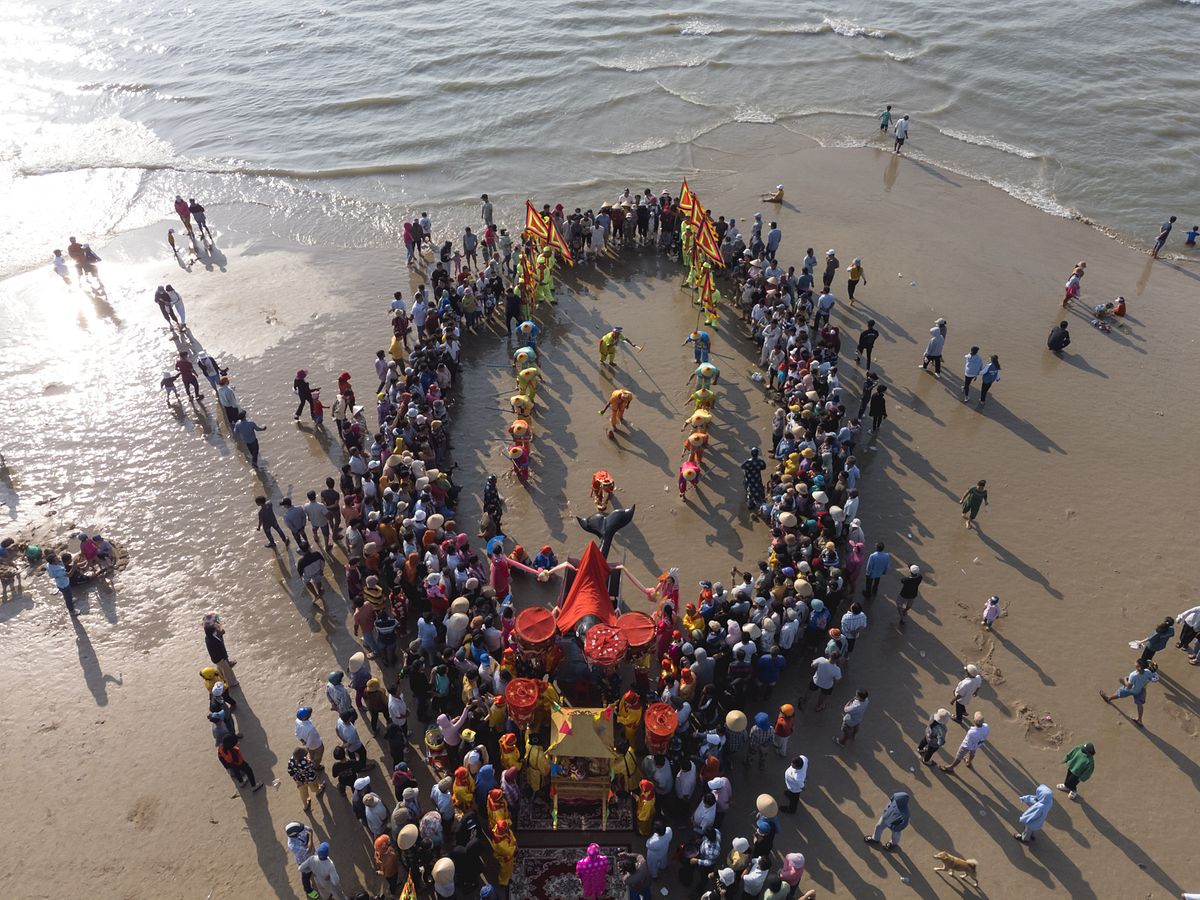Phước Hải is a fishing township in the south of Vietnam, a short ride away from Vũng Tàu.
A typically quiet town, Phước Hải dresses to impress once a year on the occasion of Lễ hội Nghinh Ông (Whale Festival), a spiritual and cultural celebration to thank the sea for providing for their needs and an opportunity to show their respect and gratitude towards Nam Hải, a whale god.

Participants in the festival don ceremonial attire and gather for an offering made to the whale god.
Whale worship is an ancient tradition anchored in the journeys of deepsea fishermen. According to local tales and legends, fishermen witness whales riding alongside their boats to offer guidance and protection at sea as well as helping to ensure prosperous outings. There are numerous stories of sailors saved at sea by benevolent cetaceans and rituals associated with whales that wash ashore.

The man with the crown represents the Nam Hải god, whereas the others represent fishermen.
From small offerings and intimate prayers, the practice of honoring whales slowly grew to more established and elaborate customs and celebrations. Whale temples flourish along the Vietnamese coast to this day where locals pray for blessings before ocean journeys and also request general assistance from Cá Ông, or “Lord Fish.” Individual whales, dolphins and porpoises that wash ashore are given proper burials similar to those of people and after several years, the bones are removed and stored in temples. Such collections have recently proven important to science in addition to their spiritual value.

A woman dressed as an imperial maid to the whale god.
Whale worship remains an important part of costal fishing communities’ culture and identity. As more individuals of the small, coastal communities move to urban areas, fewer people are involved in tending to the temples and upholding traditional beliefs. But annual festivals dedicated to the beliefs are not only a chance for adherents to take a break from difficult lives and celebrate, but also a means for inviting loved ones home and sharing their customs with outsiders.

Fruit, rice wine, flowers and incense are typically offered to the whale god similar to what is left at human altars.
Take a look at some of the photos of one such festival held in Phước Hải this March:

During the festival, the community gathers to prepare food which is provided to participants and guests for free.

The day is an opportunity for fun and socializing, independent of the spiritual beliefs underpinning it.

After the offerings are made, the procession moves out from the temple's front gate.

Familiar lion dancers are also included in the celebration.

A handmade whale statue is carried in the procession down the street.

The day is rather slow-paced and downtime spent in the front yards of the homes lining the road along the beach.

The celebration culminates beside the waves with whale god's symbolic reuniting with the ocean.

A drum gives rhythm to the day.

Because it is a chance to rest from normal labor, there is time for games and whimsical acitivies during the festival.

Intricately carved miniature boats are brought to the ocean.

Up the beach from the day's festivities, the whale graveyard remains calm.
Adrien Jean, a long-term resident of Vietnam, has traveled and photographed throughout the country, documenting ethnic festivals and life in less-visited regions, but capturing the streets of Saigon is what inspires him the most. Learn more at his website.
















